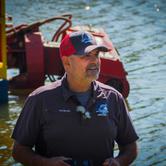5 Tips for Maintaining Fish in a Pond
Whether you have fish or other wildlife living in your HOA, golf course, or backyard pond, you'll need to perform regular maintenance to ensure a long and healthy life for all aquatic inhabitants. Follow our five favorite tips below to maintain a healthy fish pond.
Since most ponds are small, the water composition and chemistry can change in a very short period of time, which can have catastrophic consequences for fish, amphibians, and reptiles.
Small ponds are more prone to fish die-offs because the natural processes that regulate water quality are less abundant in them. Things happen quickly in a small pond, and chemical imbalances are much more severe than in a larger body of water such as a lake.
We will show you our five tips for maintaining fish and other aquatic wildlife in your pond.
Water Quality in a Fish Pond
Keeping the chemical makeup of your water at a certain level is extremely important for the health and longevity of a pond. One parameter that's off can cause a complete and total fish die-off. The beneficial bacteria that live inside your pond and help biodegrade organic waste can also be susceptible to poor water quality. The best way to maintain water parameters is to test your water weekly. You can buy test strips online that you dip into a small sample of the pond water. In a few minutes, they will tell you which parameters are off. While adding chemicals to counter bad water parameters is one way to remedy the problem, an ideal approach is to find the cause of the bad water quality and then remove it. After the issue has been removed, the pond should return to a healthy water balance.
Adding Ammonia and Nitrates to a Fish Pond
While ammonia and nitrates can be included in the above water quality section, we wanted to specifically call them out. They're specifically caused by bacteria that break down organic matter. When the ammonia or nitrate levels get too high, fish and other aquatic wildlife can die off in a matter of a few hours. While you can add chemicals to reduce the nitrate and ammonia levels in a pond, you're not fixing the actual cause of the problem. Professional pond dredging is the best way to remove the organic sediment at the pond's bottom, causing ammonia and nitrate overload.
Fish Population
To maintain a healthy fish population, limit the number of fish to 10 inches for every 100 gallons of water. This will not only ensure less competition for food but also cut down on excessive fish waste, which can lead to ammonia and nitrate levels rising out of control. If you feed the fish, do so sparingly. Overfeeding can not only cause unhealthy obesity in fish (yes, that's an actual medical condition) but can also add an extreme amount of nutrients, which can then lead to a nuisance algae outbreak. The general rule of thumb is to feed your fish once daily and no more than they can eat in two to three minutes.
Maintain Proper Oxygen Levels in a Fish Pond
Your pond should have an aerator that physically agitates the water and moves it around to facilitate the oxygen exchange from the air. The pump or aerator should be powerful enough to circulate the entire volume of water in your pond every hour. Each pump or aerator has its flow limits. Check the manufacturer's instructions to ensure you're not buying one that can't handle the gallon-per-minute flow required by your pond. Once installed, check periodically for algae and debris, as they can severely impede the flow of water, which can cause oxygen levels to drop rapidly.
Clear Debris from the Pond Banks
Finally, clear any leaves or other organic matter from the sides and banks of your pond. Bird droppings can contain a veritable petri dish of harmful bacteria that can enter your water column. Instead of washing it off with a garden hose, try to physically clean it up with a pair of gloves and a trash bag. If you don't clear the organic debris from the sides of your pond, it will eventually get deposited into the water via a gust of wind or rainstorm. It will make its way towards the bottom, adding untold amounts of harmful nutrients and other chemicals to the water.
Pond Dredging for a Healthy Fish Habitat
If you have Koi or other game fish in your pond, such as bass or trout, you owe it to your fish friends to maintain their environment. One of the best things you can do is to have your pond dredged annually. Removing harmful organic sediment will prevent the need for expensive and potentially dangerous chemical additives, and the debris can be used as fertilizer for plants and flowers. American Underwater Services has over 25 years of pond dredging experience. Call us at (817) 377-8512, and one of our friendly dredging experts will gladly answer your questions. [author_box]




